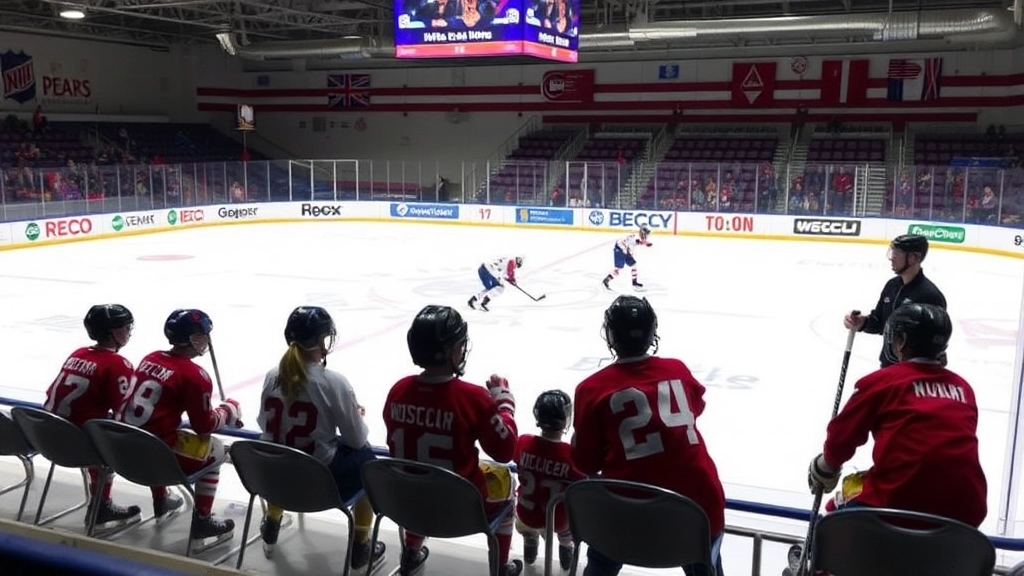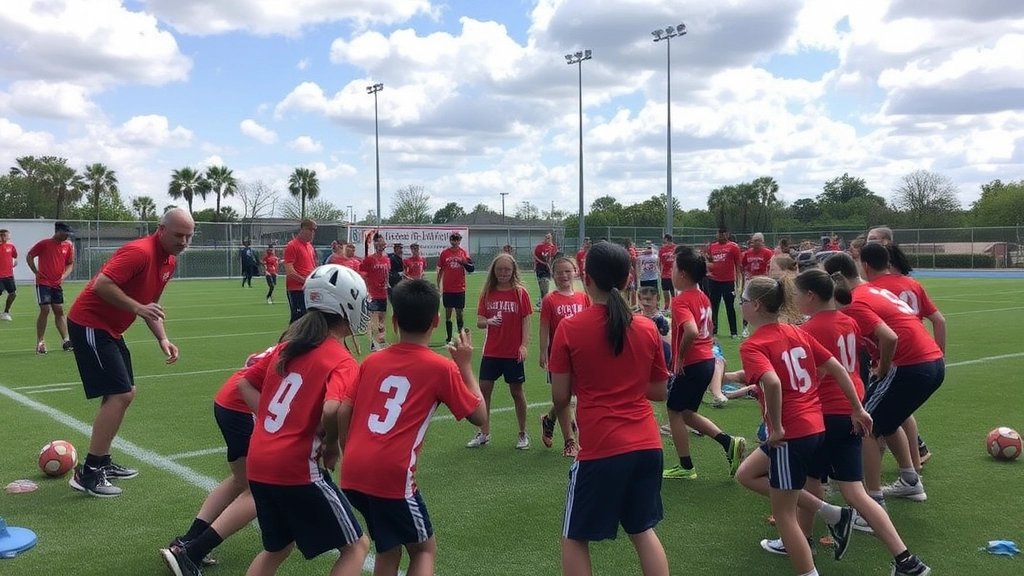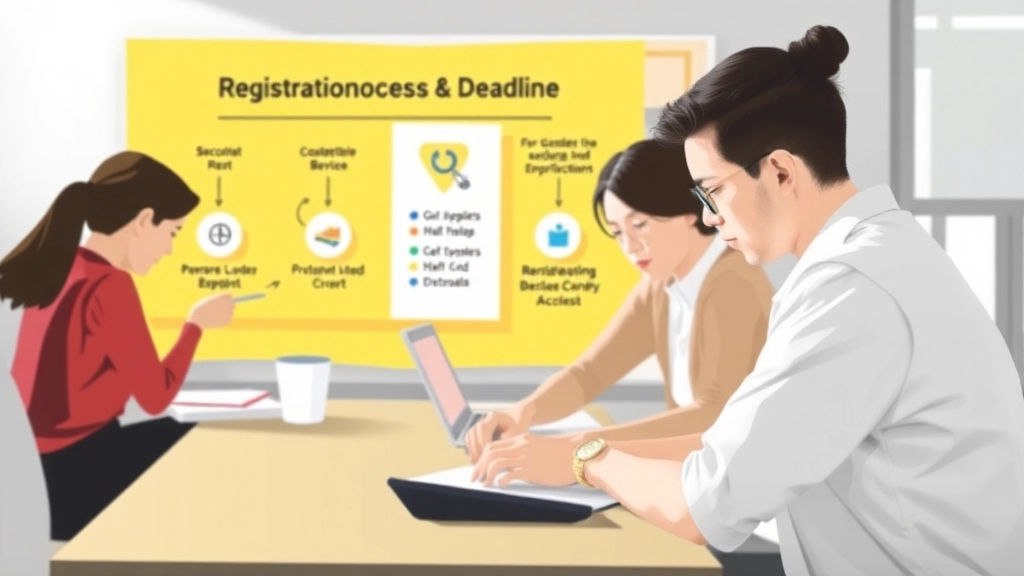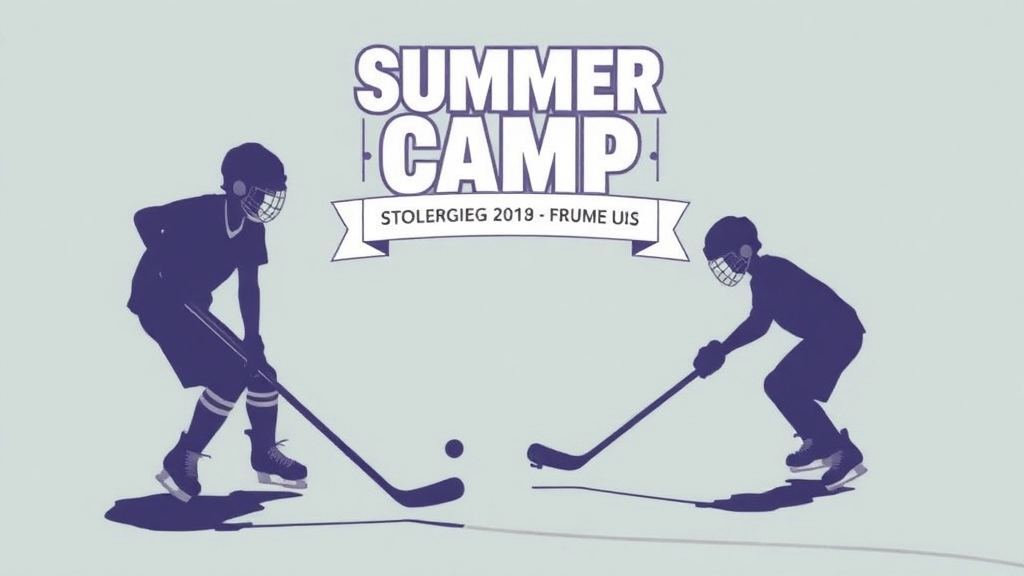Summer Camp Hockey
Summer Camp Hockey is more than just a seasonal pastime; it’s a transformative experience for young athletes. This article delves into the various types of summer hockey camps available, from skill development to elite training, and highlights the numerous benefits of attending such camps. Whether you’re a parent seeking the best fit for your child or a player eager to enhance your game, we cover everything you need to know, including how to choose the right camp, the skills and drills you can expect, and essential preparation tips.
Safety and supervision are paramount, and we detail the measures camps take to ensure a secure environment. Hear firsthand from past attendees and their success stories, which underscore the impact these camps can have on both skills and confidence. Finally, we guide you through the registration process and answer frequently asked questions to help you make an informed decision. Ready to take your hockey game to the next level? Let’s dive in!
Types of Summer Hockey Camps
Are you wondering which summer hockey camp is the best fit for you or your child? With so many options out there, it can be overwhelming. But don’t worry, I’ve got you covered. Let’s break down the different types of summer hockey camps so you can make an informed decision.
Skill Development Camps
These are your bread and butter camps. If you’re looking to improve your basic hockey skills, this is the place to be. They focus on:
- Skating Techniques: From basic strides to advanced edge work.
- Stickhandling: Mastering puck control.
- Shooting: Enhancing accuracy and power.
- Passing: Perfecting those crisp, clean passes.
Position-Specific Camps
Are you a goalie? Or maybe a forward or defenseman? Position-specific camps zero in on the unique skills required for each position.
- Goalie Camps: Focus on reflexes, positioning, and save techniques.
- Forward Camps: Emphasize scoring, speed, and offensive strategies.
- Defenseman Camps: Concentrate on blocking, positioning, and defensive tactics.
Elite/Advanced Camps
These camps are for players who are already at a high level and looking to take their game to the next level. Expect intense drills, advanced techniques, and a competitive environment.
- High-Intensity Drills: Push your limits.
- Advanced Strategies: Learn complex plays and tactics.
- Competitive Scrimmages: Test your skills against top-tier talent.
Team Camps
If you’re part of a team, these camps are a fantastic way to build chemistry and improve as a unit. They focus on:
- Team Drills: Enhance group coordination.
- Game Strategies: Work on team tactics and plays.
- Bonding Activities: Strengthen team spirit and camaraderie.
Specialty Camps
Looking for something a bit different? Specialty camps offer unique focuses such as:
- Power Skating Camps: All about speed and agility.
- Checking Camps: Learn the art of body checking safely and effectively.
- Off-Ice Training Camps: Improve your fitness and strength off the rink.
Real Questions and Worries
- âWill my kid fit in?â Most camps cater to different skill levels, so there’s a place for everyone.
- âIs it worth the money?â The skills and experiences gained often outweigh the cost.
- âWhat if my child gets injured?â Safety measures and supervision are top priorities at reputable camps.
Why It Matters
Choosing the right camp can make a huge difference in skill development and overall enjoyment. Whether you’re a beginner looking to learn the basics or an advanced player aiming to refine your skills, there’s a camp out there for you.
For more information on creating a fun and safe environment at summer camps, check out our guide on Abess Summer Camp. Additionally, if you’re interested in unique camp themes, our creative summer camp themes article might inspire you.
Benefits of Attending Hockey Camps

Ever wonder if summer hockey camps are worth it?
Let’s break it down.
Why Choose a Hockey Camp?
Hockey camps are like rocket fuel for your skills.
But why should you care?
Here’s the deal:
- Skill Boost: Camps focus on techniques and strategies. You’ll see improvements in skating, shooting, and defence.
- Confidence Builder: Nothing beats the feeling of nailing a new move. It boosts your confidence on and off the ice.
- Team Spirit: You’re surrounded by like-minded players. You’ll make friends and learn the importance of teamwork.
- Expert Coaching: Learn from the pros. Coaches offer insights you won’t get anywhere else.
Real Stories from the Rink
Imagine this:
Tom, a 14-year-old, was struggling with his slap shot.
After a week at camp, he was hitting the puck like a pro.
His secret?
Focused drills and personalised feedback.
What’s in it for Parents?
- Safe Environment: Camps are well-supervised. You can relax knowing your child is in good hands.
- Structured Schedule: Keeps kids active and engaged. No more “I’m bored” complaints.
Choosing the Right Camp
Picking the right camp can feel overwhelming.
Here’s a quick checklist:
- Location: Close to home or a new adventure?
- Focus: Is it skills, conditioning, or both?
- Duration: A week or a full summer?
How to Choose the Right Camp
Choosing the right summer hockey camp can feel like trying to pick the best flavour at an ice cream shop. So many options, so little time. But don’t sweat it; I’m here to help you navigate through this maze. Whether you’re a parent looking to give your kid the best experience or a player wanting to sharpen your skills, here’s a breakdown to make your decision easier.
What Are Your Goals?
First things first, ask yourself: What do I want to get out of this camp? Different camps focus on different aspects of the game. Here are some common goals:
- Skill Development: Camps that focus on specific skills like skating, shooting, or stickhandling.
- Team Play: Camps that emphasise teamwork, strategy, and game situations.
- Conditioning: Camps designed to improve your physical fitness and endurance.
- Fun and Socialising: Camps that offer a mix of hockey and recreational activities.
Types of Camps
Now, let’s break down the types of camps you might come across:
- Day Camps: Perfect if you want to stay local. These camps usually run from morning to late afternoon.
- Overnight Camps: Great for an immersive experience. You stay at the camp for a week or more.
- Specialty Camps: Focus on specific skills or positions, like goalie camps or power skating camps.
- Elite Camps: Designed for advanced players looking to take their game to the next level.
Do Your Homework
Before you make a decision, do a bit of research:
- Check Reviews and Testimonials: Look for feedback from past attendees. What did they like or dislike?
- Coaching Staff: Who are the coaches? Are they experienced? Do they have a good track record?
- Facilities: What kind of facilities does the camp offer? Are they up to standard?
- Location: Is the camp easily accessible? How far are you willing to travel?
Budget Considerations
Let’s be real, cost matters. Camps can range from affordable to pretty pricey. Here are some tips to manage the budget:
- Early Bird Discounts: Many camps offer discounts if you register early.
- Scholarships: Some camps provide financial aid or scholarships.
- All-Inclusive vs. A La Carte: Understand what’s included in the fee. Are meals, lodging, and equipment rentals extra?
Questions to Ask
Before you commit, get answers to these questions:
- What is the camper-to-coach ratio?
- What does a typical day look like?
- What safety measures are in place?
- Are there any additional costs?
Real Stories
I remember a mate of mine, let’s call him Dave, who attended an elite camp a few summers ago. He was on the fence because of the cost, but he took the plunge. Fast forward to now, Dave’s playing at a semi-pro level, and he swears that camp was a turning point in his career. Sometimes, the right camp can make all the difference.
For more tips on making the most out of your summer camp experience, check out our guide on summer camp weekly themes.
Skills and Drills Focused in Camps

Alright, let’s cut to the chase.
You’ve signed up for a summer hockey camp, but what exactly are you going to learn?
What skills and drills are they going to hammer into your game?
Here’s the lowdown.
Skating Skills
First up, skating.
If you’re not a strong skater, you’re not much of a hockey player.
Camps focus heavily on:
- Speed and Agility: Quick starts, stops, and turns.
- Edge Work: Mastering those inside and outside edges.
- Balance and Coordination: Staying on your feet, even when the going gets tough.
Stickhandling and Puck Control
Next, let’s talk about stickhandling.
You need to keep that puck glued to your stick.
Drills include:
- Puck Protection: Shielding the puck from defenders.
- Deeking and Dangles: Faking out opponents.
- Quick Hands: Rapid stick movements to maintain control.
Shooting Techniques
Shooting is where the magic happens.
You gotta score to win, right?
Camps focus on:
- Wrist Shots: Quick and accurate.
- Slap Shots: Power and precision.
- Backhand Shots: Catching goalies off guard.
Passing and Team Play
Hockey is a team sport.
You need to pass well to play well.
Drills here focus on:
- Accuracy: Hitting your target every time.
- Speed: Quick passes to keep the play moving.
- Vision: Seeing the ice and anticipating plays.
Defensive Skills
You can’t win games without a solid defence.
Key areas include:
- Positioning: Being in the right place at the right time.
- Stick Checks: Disrupting your opponent’s play.
- Body Contact: Using your body to your advantage.
Goalie Training
Goalies, don’t worry, you’re not left out.
Specific drills for you include:
- Positioning: Covering the angles.
- Reflexes: Quick reactions to shots.
- Puck Handling: Playing the puck effectively.
Real Talk
I remember my first camp.
I was nervous.
Didn’t know what to expect.
But the skills and drills were a game-changer.
By the end, I felt like a new player.
Wrapping Up
So, there you have it.
The skills and drills you’ll focus on at summer hockey camps.
Whether it’s skating, shooting, or stickhandling, you’ll come out stronger and smarter.
Ready to dominate the ice.
Got any questions?
Feel free to ask.
Let’s get you prepped and ready.
For more on choosing the right camp, check out our How to Choose the Right Camp.
And don’t forget to see what others are saying in our Testimonials and Success Stories.
Stay sharp, stay focused, and let’s get to work.
Preparing for Camp: What to Bring
Alright, so you’re all pumped up and ready to hit that summer hockey camp. But wait, what do you actually need to bring? Let’s cut through the fluff and get straight to the essentials. Trust me, you don’t want to be that guy or gal who shows up missing half their gear. So, what exactly should you pack to make sure you’re fully prepared?
Essentials for Every Hockey Camper
First off, hockey gear. This is non-negotiable. Here’s a quick checklist to make sure you’ve got everything covered:
- Helmet with a full cage or shield (safety first, folks)
- Mouthguard (you want to keep those pearly whites intact)
- Shoulder pads and elbow pads (no one likes bruises)
- Hockey gloves (gotta protect those hands)
- Hockey pants and shin guards (for obvious reasons)
- Skates (duh)
- Stick (maybe even a backup if you can swing it)
- Jock or Jill (yeah, it’s awkward, but necessary)
- Socks and jersey (most camps provide these, but check to be sure)
Off-Ice Gear and Personal Items
Now, let’s talk about off-ice essentials. You’ll need some personal items to keep you comfortable and ready for anything:
- Workout clothes (you’ll be doing more than just skating)
- Running shoes (for off-ice training)
- Water bottle (stay hydrated, it’s crucial)
- Towel and shower essentials (no one likes a stinky teammate)
- Snacks (keep your energy levels up)
- Sunscreen (if any activities are outside)
- Notebook and pen (for jotting down tips and drills)
Pro Tips for Packing
Here are a few extra tips to make your packing process smooth and efficient:
- Label everything: Trust me, gear can get mixed up easily. For more tips on how to keep your camp experience organized, check out our Summer Camp Starter Pack.
- Pack a small first aid kit: Just in case of minor injuries.
- Bring extra laces and tape: These can be lifesavers. And if you’re looking for more insights into summer camp essentials, don’t miss our Summer Camp Uniform Essentials.
Real Talk: What Happens If You Forget Something?
Okay, let’s get real for a second. What if you forget something? It’s not the end of the world, but it can be a hassle. Most camps have a pro shop or nearby store where you can grab missing items, but it’s better to come prepared.
Safety Measures and Supervision

Alright, let’s talk safety.
One of the biggest worries for parents and players alike is: “How safe is this summer hockey camp?”
I get it. You’re sending your kid away and you want to make sure they’re in good hands.
Safety Measures in Place
First things first, let’s break down the safety measures you can expect:
- Qualified Staff: Camps hire trained professionals who know their stuff. We’re talking coaches with certifications, first-aid knowledge, and years of experience.
- Medical Support: Most camps have on-site medical staff or easy access to nearby medical facilities. Injuries happen, but quick response times make a huge difference.
- Equipment Checks: Regular checks on all gear to ensure everything’s in top shape. Helmets, pads, sticks – you name it, they’re on it.
- Supervised Activities: No free-for-all here. Every drill, game, and practice session is closely monitored. Coaches keep a keen eye to make sure everyone’s playing safe.
Supervision: Keeping an Eye Out
Now, what about supervision?
- Coach-to-Player Ratio: Camps maintain a low coach-to-player ratio. This means more eyes on each player, ensuring they get the guidance and oversight they need.
- 24/7 Supervision: Yes, even off the ice. Dorms, dining halls, and recreational areas are all supervised. Your kid isn’t just left to fend for themselves.
- Emergency Protocols: Camps have clear protocols for emergencies. Whether it’s a fire drill or a sudden injury, everyone knows what to do.
Real Stories, Real Reassurance
Still worried? Here’s a story for you.
Last summer, a player named Jake took a nasty spill during a drill. Within seconds, the coach was there, and the medical team followed right after. Jake was back on his feet in no time, thanks to the quick response and proper care.
Why It Matters
Safety isn’t just about preventing injuries. It’s about creating an environment where players can focus on improving their skills without worry.
Your Checklist
When choosing a camp, ask these questions:
- Are the coaches certified?
- What’s the coach-to-player ratio?
- Is there medical staff on-site?
- How often is the equipment checked?
- What are the emergency protocols?
Testimonials and Success Stories
Ever wondered if summer hockey camps are worth the hype? You’re not alone. Many parents and young players have the same question. Let’s dive into some real-life testimonials and success stories to give you a clear picture.
Real Stories from Real Players
“I was struggling with my slap shot and skating speed,” says Jake, a 14-year-old from London. “After attending a summer camp, my slap shot improved dramatically, and I gained more confidence on the ice. The coaches were fantastic, and I made friends who share my passion for hockey.”
Emily, a 16-year-old goalie, shares her experience: “I used to get really nervous before games. The mental conditioning sessions at the camp helped me manage my anxiety. I also learned new techniques that have made me a better goalie. It was a game-changer for me.”
Parent Perspectives
Parents also have their own success stories to share. “My son was always passionate about hockey but lacked the skills,” says Sarah, mum of 12-year-old Ben. “After attending the camp, his skills improved significantly. More importantly, his self-esteem soared. He’s now more confident both on and off the ice.”
Coaches’ Insights
Even coaches have noticed the difference. Coach Mark, who has been involved in summer hockey camps for over a decade, says, “The transformation I see in players over just a few weeks is incredible. They come in with raw talent and leave with a refined skill set and a deeper understanding of the game.”
Key Takeaways from Testimonials
These testimonials aren’t just feel-good stories; they highlight the real benefits of attending summer hockey camps:
- Skill Improvement: From slap shots to skating speed, players see tangible improvements.
- Confidence Boost: Both on and off the ice, players gain self-esteem.
- Mental Conditioning: Camps offer techniques to manage game-day anxiety.
- Friendship and Community: Players build lasting relationships with peers who share their passion.
Why These Stories Matter
These success stories are more than just anecdotes; they provide a real-world perspective on the impact of summer hockey camps. They show that these camps are not just about improving hockey skills but also about personal growth and building a supportive community.
For more insights on how camps can foster personal growth, check out our article on the culture, traditions, and activities at summer camps. Also, if you’re looking for a well-rounded camp experience, explore our guide on the top summer camps for teens.
Registration Process and Deadlines

Alright, let’s talk about the registration process and deadlines for summer hockey camps.
Worried you’ll miss the deadline?
Not sure what info you need to register?
Don’t stress.
I’ve got you.
First things first.
You need to know the deadlines. Most camps fill up fast, so you want to jump on this early.
Here’s a quick rundown:
- Early Bird Registration: Usually opens in January. You can snag some discounts here.
- Regular Registration: Runs from February to April.
- Late Registration: May to June, but spots are limited.
Key Steps to Register:
- Visit the Camp’s Website: This is where you’ll find all the details.
- Fill Out the Form: You’ll need basic info like name, age, and skill level.
- Medical Info: Camps need to know about any allergies or medical conditions.
- Payment: Most camps accept credit cards and sometimes offer payment plans.
- Confirmation: Once you’ve paid, you’ll get a confirmation email.
Pro Tip:
Set a reminder on your phone for the registration opening date.
What if you miss the deadline?
Some camps have waiting lists. It’s worth getting on one just in case someone drops out.
Here’s a little story:
Last year, my mate Tom almost missed out on his dream camp because he procrastinated. He got on the waiting list and, guess what? A spot opened up two weeks before the camp started. He had the time of his life.
FAQs You Might Have:
- Can I get a refund if I change my mind? Most camps have a refund policy, but it varies. Check the fine print.
- What if my kid gets sick? Camps usually offer credits for future camps or partial refunds.
- Do camps offer scholarships? Some do. Look for this info on the camp’s website.
Final Thought:
Don’t wait. Get your registration done early, mark those deadlines, and secure your spot. Trust me, you don’t want to be the one missing out while your mates are having a blast.
Ready to register?
Jump on it now and thank yourself later.
Frequently Asked Questions About Hockey Camps
Alright, let’s dive into the nitty-gritty.
What’s the best age to start attending hockey camps?
Honestly, there’s no perfect age. Kids as young as 5 can benefit, but it’s never too late to improve your game.
How long do summer hockey camps typically last?
Most camps run for a week, but some can be as short as a weekend or as long as a month.
Are these camps only for advanced players?
Nope. Most camps cater to all skill levels, from beginners to advanced players. They often split groups based on skill and age.
What should I bring to camp?
- Full hockey gear (helmet, pads, skates, etc.)
- Water bottle
- Extra clothes
- Snacks
- Personal items (toiletries, etc.)
Is there a focus on specific skills?
Absolutely. Camps usually zero in on key skills like skating, stickhandling, shooting, and game strategy.
How safe are these camps?
Safety is a top priority. Expect certified coaches, medical staff on-site, and strict adherence to safety protocols.
Can parents watch the sessions?
Most camps allow it, but it’s best to check with the specific camp for their policy.
What if my child has dietary restrictions?
No worries. Most camps accommodate dietary needs. Just inform them in advance.
How do I know if a camp is reputable?
- Reviews and testimonials
- Qualified coaching staff
- Affiliations with reputable hockey organisations
What’s the cost of attending a hockey camp?
Costs vary widely. You’re looking at anywhere from £100 to £1000, depending on the camp’s duration and amenities.
Is financial aid available?
Some camps offer scholarships or payment plans. Check with the camp directly.
How do I register?
Usually, it’s a simple online process. Check the camp’s website for deadlines and required forms.
When should I register?
Early bird gets the worm. Spots fill up fast, so register as soon as you can.
Can I get a refund if we change our plans?
Policies vary. Some camps offer refunds, others might not. Always read the fine print.
Got more questions?
Reach out directly to the camp. They’re there to help.
FAQs About Summer Camp Hockey
What are the main benefits of attending a summer hockey camp?
Attending a summer hockey camp offers several benefits, including a significant skill boost in areas like skating, shooting, and defense. It also helps build confidence, fosters team spirit, and provides access to expert coaching.
What kinds of skills and drills are focused on in hockey camps?
Hockey camps focus on a variety of skills and drills, including skating skills (speed, agility, edge work), stickhandling and puck control (puck protection, deking, quick hands), shooting techniques (wrist shots, slap shots, backhand shots), passing and team play (accuracy, speed, vision), and defensive skills (positioning, stick checks, body contact). Specific goalie training is also provided.
How are safety and supervision handled at hockey camps?
Safety measures include hiring qualified staff with certifications and first-aid knowledge, having on-site medical support, regular equipment checks, and supervised activities. Camps maintain a low coach-to-player ratio and have clear emergency protocols.
What is the typical registration process and deadline for summer hockey camps?
The registration process typically involves visiting the camp’s website, filling out a form, providing medical information, and making a payment. Deadlines are usually divided into early bird (January), regular (February to April), and late registration (May to June). It’s advisable to register early as spots fill up fast.
What should parents look for when choosing a hockey camp?
Parents should consider the camp’s location, focus (skills, conditioning, or both), and duration (a week or a full summer). They should also inquire about the qualifications of the coaches, the coach-to-player ratio, on-site medical support, and emergency protocols.
Are there any financial aids or scholarships available for hockey camps?
Some camps offer scholarships or financial aid. It’s best to check the camp’s website for specific information on available financial support.
What if my child gets sick or we need to cancel the registration?
Most camps have refund policies, though they vary. Some camps offer credits for future camps or partial refunds if a child gets sick. It’s important to check the camp’s specific refund policy.
How can I ensure my child is safe at camp?
Ensure the camp has qualified staff, on-site medical support, regular equipment checks, and clear emergency protocols. Asking about the coach-to-player ratio and supervision measures can also provide peace of mind.
What if I miss the registration deadline?
If you miss the deadline, some camps have waiting lists. It’s worth getting on one in case a spot opens up. Early registration is highly recommended to avoid this situation.
Are there any success stories from past camp attendees?
Yes, many attendees have seen significant improvements. For example, a 14-year-old named Tom improved his slap shot dramatically after a week at camp, thanks to focused drills and personalized feedback.
What should I do if I have more questions?
If you have more questions, feel free to ask the camp directly or check out resources like How to Choose the Right Camp and Testimonials and Success Stories for additional information.
References
-
USA Hockey – Camps
-
Hockey Canada – Camps and Clinics
-
Elite Hockey Camps

